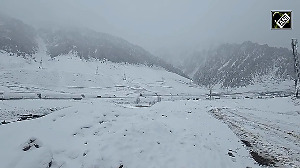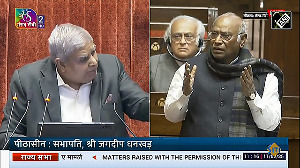Prime Minister Atal Bihari Vajpayee has regretted that the South Asian Preferential Trading Arrangement languished because of the "unreasonable obstructions" of one country, an indirect reference to Pakistan, but expressed confidence that the proposed India-Thailand free trade agreement would be successful in meeting its objectives.
| |||||||||||
"The India-Thailand FTA looks like it will work, while the South Asia Preferential Trading Arrangement has not seen real progress solely because of the unreasonable obstructions of one south Asian country," Vajpayee told newspaper Nation in Bangkok.
He said deepening and broadening all-sided ties between India and Thailand would serve as a factor for prosperity, stability and peace in Asia besides being mutually beneficial.
Vajpayee said similarities between Thailand and India were rooted in history.
"Our ties are rooted in a shared cultural and spiritual heritage enriched by the legends of Ramayana and the immortal teachings of the Buddha," he told the local daily.
People of India admired Thailand's accomplishments in both traditional and hi-tech areas, said Vajpayee, who flew in here late last night on a three day visit, during which the two countries will sign the free trade agreement.
Referring to India's increasing trade with the ASEAN, Vajpayee noted that India's business dealings with the region had gone up from $3.5 billion in 1991 to $12.5 billion in 2002.
"It looks like it may even exceed $15 billion in the next two years," he said.
Referring to the collapse of Cancun trade talks, Vajpayee said the breaking down of the talks was a disappointment, but "it is not the end of the road in the search for a rule-based multilateral trading system."
On progress of the liberalisation of the Indian economy, Vajpayee said the reforms had resulted in remarkable gains, particularly in the last five years.
"The benefits are increasingly reaching the masses. Consumers have a greater choice of products and services and competition keeps the prices in check," he added.
On his economic agenda, the prime minister said his government had focused on tackling the socio-economic consequences of high economic growth.
"We will continue to move forward with our liberalisation measures in a development-oriented and people-friendly manner," he said.
Vajpayee is scheduled to address the joint session of Thai Parliament on Thursday.






 © 2025
© 2025